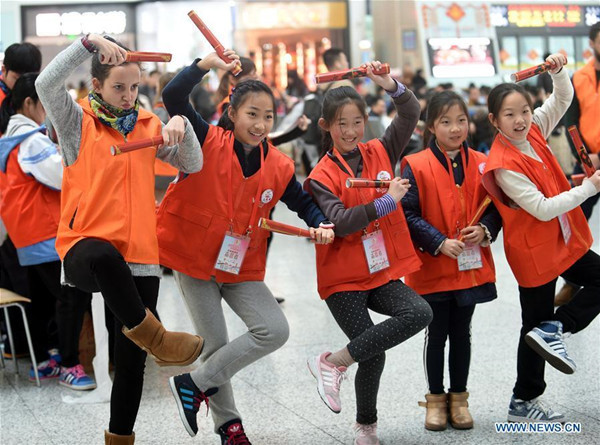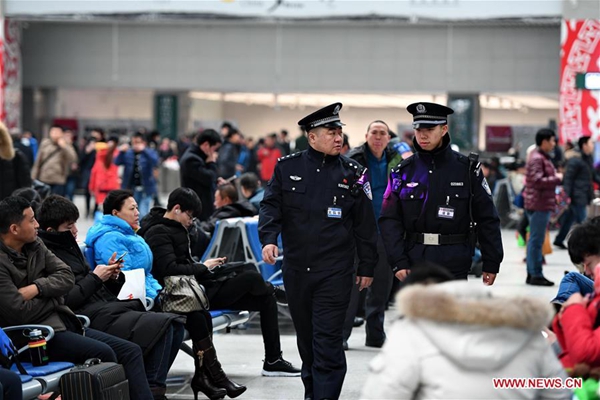Foreign volunteers help make Chunyun easier
|
|
|
Rachel (1st L) from Britain performs the Monkey King with young volunteers during a break at the East Railway Station of Hangzhou, capital of east China’s Zhejiang Province, Jan. 23, 2017. Five foreign volunteers worked at the railway station to offer help to passengers who rush home for family reunion during the Spring Festival. (Xinhua/Wang Dingchang) |
This Spring Festival, a group of foreigners volunteered to give something back to China as a gesture of thanks for what China has done for them.
Yu Zhongyan, was among about 80,000 passengers that will use Wuhan railway station each day during the Spring Festival travel rush, or Chunyun, this year.
She was deeply touched when the volunteers offered to help her with her bags.
“They made our holiday special this year,” said the granny with her grandson in arms.
Wuhan, the capital city of the central province of Hubei, is one of the country’s busiest railway hubs. This year 28 foreign students from 15 countries, wearing yellow hats and orange vests, were on hand to help passengers.
Thursday is Bassim Mohammed Dahash Aljizani’s last day in Wuhan. He earned his doctorate at Huazhong University of Science and Technology.
Together with his wife and three sons, the man had five suitcases and a buggy. Sadi Makangila Patrick from the Democratic Republic of the Congo and Agil Mubariz from Azerbaijan hurried to help.
Aljizani told Xinhua that he will take the train to Guangzhou, before flying back to Baghdad. “I have been in Wuhan for four years and I really don’t want to leave, but my country needs me,” he said.
“It is great experience to see people off at the station,” said Areen Muhammed, a student from Iraq. “The work is tiring. But when I see the smiles, I feel so happy.”
“China’s government provides us scholarship for our study here,” said another volunteer from Sri Lanka. “China helped me, and in return, I would like to do something for the people here.” [ Yuan Gaoping, an official with Wuhan railway bureau, said that by working in the station, the volunteers could experience Chunyun, and experience Chinese culture and the development of its railway firsthand.
Yu Zhongyan asked Patrick to pose for a photo together, before bidding farewell to the foreign “uncle.” “Thank you,” said the boy, while Yu waved, “Happy New Year.”


